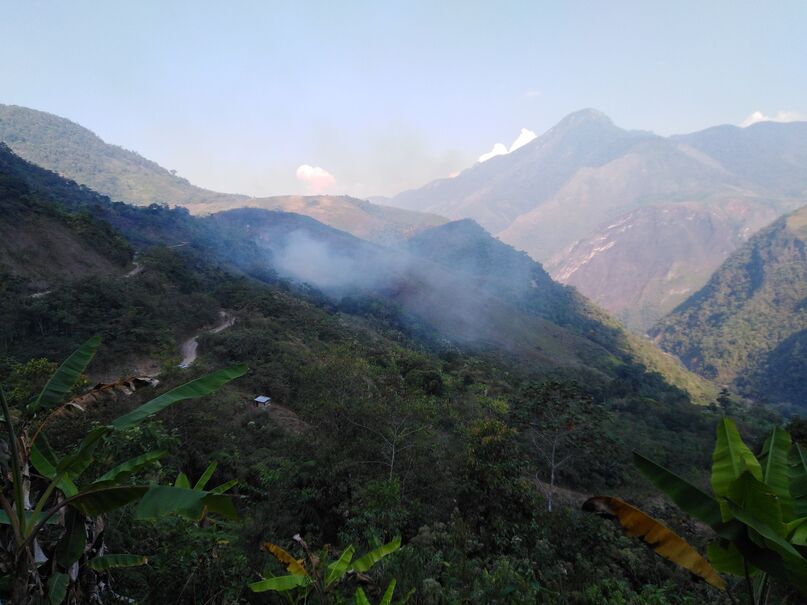ITTO fire guidelines and projects featured at 8th International Wildland Fire Conference
26 May 2023

A fire-prone landscape in the mountainous area of Huanuco, one of five departments in Peru where the ITTO fire-prevention project was implemented. Photo: SERFOR
Yokohama, Japan, 26 May 2023: Three ITTO projects on fire prevention and response, and the Organization’s guidelines on fire management in tropical forests, were the focus of a workshop held as part of the 8th International Wildland Fire Conference in Porto, Portugal, last week. The conference also adopted the Landscape Fire Governance Framework to promote collaboration on fire management.
ITTO’s Dr Hwan-ok Ma, who moderated the ITTO-hosted workshop, said the ITTO fire projects, the design of which drew on the principles established in the ITTO Guidelines on Fire Management in Tropical Forests, have been instrumental in building capacity in Ghana, Indonesia and Peru, and elsewhere in the tropics. He spoke of ITTO’s long-term commitment to combating forest fires and improving fire management and underscored the importance of collaborative efforts.
Professor Johann Georg Goldammer, a renowned global forest fire expert and Chief of the Global Fire Monitoring Center (GFMC), said the ITTO fire management guidelines had been pioneering when they were published in 1997. In turn, they had played an important role in the development of the Health Guidelines for Vegetation Fire Events, published by the World Health Organization in 1999, and FAO’s Fire Management Voluntary Guidelines, published in 2006. Professor Goldammer said the GFMC’s Village Defense Guidelines, published in 2013, offer essential guidance on protecting villages and farms against wildfires. Sharing lessons learnt among the three tropical regions is vital to advancing progress in integrated fire management and strengthening international cooperation in this field, he said.
Dr Lucy Amissah, a forest ecologist at the CSIR-Forestry Research Institute of Ghana, talked about community-based forest fire management. She said the outcomes of an ITTO project in her country, “Fire management and post-fire restoration with local community collaboration” [PD 284/04 Rev. 2 (F)], showed that community fire management can be an effective approach, particularly when it makes use of local governance structures such as traditional authorities. Sustainable solutions to forest wildfire require the integration of fire management into all landscape restoration and forest management initiatives, with active community participation, she said.
Ms Elvira Gomez Rivero at Peru’s National Forest and Wildlife Service (SERFOR), presented the outcomes of the ITTO project, “Forest fire prevention and response in tropical forests and forest plantations in Peru” [PP-A/56-340-2]. She said the project had made significant contributions to capacity building among local authorities, local leaders and rural development promoters in the regions of Cajamarca, Huánuco, Junín Pasco and Ucayali. She spoke about a successful intercultural strategy implemented in collaboration with the Ministry of Culture that engaged Indigenous Peoples in several communities and improved forest fire prevention efforts.
Professor Bambang Hero Saharjo, at IPB University, Indonesia, said it is crucial to find alternative means for clearing land by both local communities and corporations that do not involve burning. There was also a need to increase fire management capacity—a recent ITTO project in Indonesia (“Capacity building on forest and land fire management” [PP-A/56-340-1]) had achieved excellent results in a short period, but more such efforts were needed. Professor Bambang spoke about the need for scientific interventions to mitigate greenhouse-gas emissions from fire and the importance of accurate information on, for example, fire-generated pollution, fire mapping and smoke spread.
Among other topics discussed during the workshop were the importance of involving social scientists in integrated forest management and the need for stronger enforcement of forest laws to reduce the risk of wildfire. There was general agreement on the importance of international cooperation to address tropical forest fires, given that tropical forests account for about one-third of the global forest area, are increasingly vulnerable to wildfire, and are vital for the products and ecosystem services they provide and the biodiversity they harbour.
Also during the conference, the Landscape Fire Governance Framework was adopted with the aim of better preparing societies to achieve the Sustainable Development Goals and to reduce risks to people and the environment caused by fire. The framework will promote collaboration among governments, businesses, academia, and civil society and foster balanced and technically informed solutions to address the challenges of landscape fires.
Download the side-event presentations here below.


